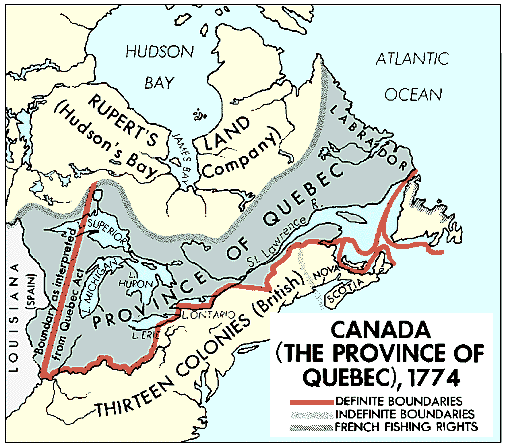The Quebec Act of 1774, a law passed by the British Parliament impacting the Canadian province of Quebec, contained several provisions related to religious freedom.
Quebec Act had First Amendment principles of religious freedom
Specifically, the law provided for the protection of the Roman Catholic faith. Even though it was passed for political reasons to ensure the loyalty of French Canadians to the British government, the law contained several sections that dealt with religious freedoms and, thus, are in some sense progenitors of the principle of religious freedom found in the First Amendment.
Quebec had been settled by the French but had come under British rule in 1763, at the end of the French and Indian War—or the Seven Years’ War, as it was known in Europe.
Quebec Act repealed loyalty oath, established religious freedoms
After the war ended with a decisive victory for the British and the defeat of France and Spain, France ceded Quebec and all its claims to the Ohio River Valley to the British Empire. The British established their colonial policy toward Quebec in the Royal Proclamation of 1763, which provided for a royal governor and a loyalty oath that precluded Roman Catholics from service in Quebec’s colonial administration.
A few years later Parliament passed the Quebec Act of 1774, granting emancipation for the Catholic, French-speaking settlers of the province. The act repealed the loyalty oath and reinstated French civil law in combination with British criminal law.
British settlers saw Quebec Act as wedge between Canada and American colonists
The British colonists, who had settled in the 13 American colonies, regarded the Quebec Act as one of the Intolerable Acts, exhibiting the British Empire’s intention to deny the colonists their inalienable rights and helping to push them toward revolution.
The British settlers, like their forebears, were almost uniformly Protestant, holding anti-Catholic sentiments and opposing a legally supported system of hereditary nobility. They also were enraged by the Crown’s decision to deny their land claims in the Ohio Valley and believed that Britain had an interest in driving a wedge between them and their French-speaking neighbors to the north.
The Quebec Act did not succeed in rallying Canadians against the British colonies. Although the Second Continental Congress made provision in the Articles of Confederation (1781) for Canada to join the former British colonists, neither this provision nor American-launched invasions of Canada during the War of 1812 accomplished such a union.
This article was originally published in 2009. Paul J. Cornish is Associate Professor of Political Science at Grand Valley State University. He has published articles on the political thought of John Adams, and on the concepts of natural rights, toleration, and constitutional government in the Catholic natural law tradition

